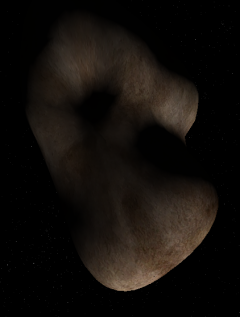4769 Castalia
|
Project home: AsteroidPack 1.00.zip |
4769 Castalia is a near-Earth object of the Apollo group of asteroids. It was discovered by w:Eleanor Helin at w:Palomar Observatory on 9 August 1969, and on 28 August 1989, Castalia was observed by radar at w:Arecibo Observatory, the first asteroid modeled by radar. Castalia was made available in Orbiter by Nighthawke's AsteroidPack v1.00 zip file.
Physical Characteristics in Orbiter
In Orbiter Castalia appears to be a contact binary, has a mean diameter of about 1800 meters and a mass of 5×1011 kg. Surface Gravity is about 0.00001 m/s2, and escape velocity is about 0.2 m/s. Landing on Castalia near the waist the spacecraft will land on the radius above the texture surface, but, near the ends, it will land below the texture surface.
Orbital characteristics in Orbiter
The orbit of Castalia varies from inside the orbit of Venus to just outside that of Mars, Semimajor axis is about 159 million Km at an eccentricity 0.483, inclination is of Orbital period is about 400 days.
